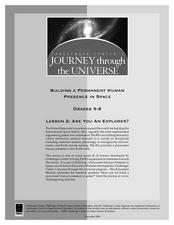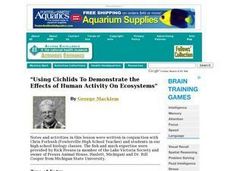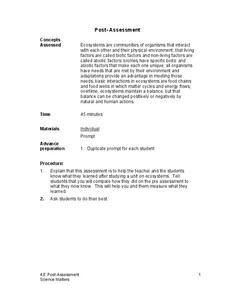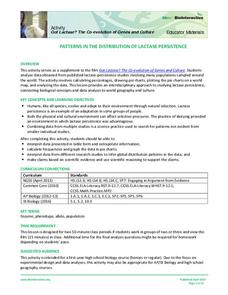Curated OER
Understanding the Indoor Environment: The Movement of Air
Young scholars discuss HVAC to assess prior knowledge. Students create a rubric to assess their modals of HVAC units, and build the models according to instructions and discussion by the teacher.
Curated OER
Biofuels and the Environment
In this reading comprehension worksheet, students read a passage on biofuels and answer reading comprehension questions.
Curated OER
Environment: Just Around the Bend
Students decipher landforms on a map and corresponding satellite imagery. They consider the impact of pollution on agriculture and water. They draw diagrams demonstrating how pollution works its way into the food source.
Curated OER
Building a Permanent Human Presence in Space
Students tudy space and what it takes to be an explorer. In this space explorer lesson students examine the characteristics of explorers and create an exploration log.
Curated OER
"Using Cichlids To Demonstrate the Effects of Human Activity On Ecosystems"
Students explore the freshwater ecosystem of Africa's Lake Victoria by creating a freshwater aquarium. They investigate factors affecting the aquarium's ecosystem and conduct lab activities.
Curated OER
The Power of the Environment in Our Lives
Young scholars participate in a series of activities designed to demonstrate the differences between symbiotic and parasitic relationships. They discuss the differences and catergorize man's relationship with nature.
Curated OER
Environment: Assess Your Habitat's Health
Students research their ecozone in Canada and label on maps various parks and wildlife areas. They role-play as doctors with their ecozones as patients and search for symptoms from pollution, urbanization, loss of habitat, and decline of...
Curated OER
Yeast Cells and their Environment
Students study the scientific method and explore how to design an experiment. In this investigative lesson students explore and hypothesis an experiment then carry it out to find the results.
Curated OER
Applied Science - Built Environment Pre Lab (Morse Code)
Students study communication. In this telegraph lesson, students examine Morse code and the composition of an elementary telegraph circuit. They listen to a presentation and try to create Morse Code messages on a worksheet. This lesson...
Curated OER
How Much Motor Oil Would You Like in Your Bed?
Eighth graders use their understanding of buoyancy to understand the horrible effect of the Exxon Valdez oil spill. Students perform an experiment where they combine three unnatural liquids, and then they are asked various questions to...
Curated OER
People, Places and Environments
Middle schoolers predict a future for Gary, IN and US Steel Works. They explain how their own town would change if US Steel built this large of a facility in it and discuss why or shy not their town would have been an alternative to...
Curated OER
Applied Science- Built environment Lab (Trains)
Learners examine transportation. In this train design lesson, students study how trains work and how to efficiently design a track by working with an electric train set. As a class they compare various types of trains and work...
Chicago Botanic Garden
Impacts of Climate Change
Scholars become experts on the eight major impacts of climate change through a jigsaw and grand conversation. They then research and present what they learned about effects specific to their region.
Kenan Fellows
Sustainability: Learning for a Lifetime – The Importance of Water
Water is essential for life—and understanding the importance of clean drinking water is essential in understanding sustainability! Show your environmental science class the basics of water testing and treatment through a week-long...
Chicago Botanic Garden
Calculating Your Carbon Footprint
Unplugging from technology for one day per week will decrease your carbon footprint—are you up to the challenge? Part two in a series of three allows individuals to explore their personal carbon footprints. By first taking a quiz at home...
Wilderness Classroom
Pollution
Educate scholars on pollution—air, water, and land—with a series of lessons that begin with a thorough explanation of each type. Learners then take part in three activities to reinforce the importance of reducing pollution. They...
Chicago Botanic Garden
Personal Choices and the Planet
The last activity in the series of four has individuals determine steps they can take to reduce their carbon footprints and then analyze their schools' recycling programs. Through a sustainability audit, they identify how and where their...
K12 Reader
Taking Care of Earth
Provide a brief introduction to ecology and conservation with a reading passage. Learners can read the text, answer the five related questions that are included on the page, and discuss the reading.
Chicago Botanic Garden
Accessing Prior Knowledge: Global Climate Change Survey
Begin a unit on weather and climate change by assessing prior knowledge of the topic. Learners respond to a survey with questions that ask what they think causes climate change, the effects of climate change, and if it is important to...
Science Matters
Ecosystem Pre-Assessment
Test scholars' knowledge of ecosystems with a 20-question pre-assessment. Assessment challenges learners to answer multiple choice questions, read diagrams, and complete charts.
Science Matters
Post-Assessment
Twenty questions make up an assessment designed to test super scientists' knowledge of ecosystems. Scholars answer multiple-choice and short-answer questions about organisms, food chains, energy flow, and more.
Howard Hughes Medical Institute
Patterns in the Distribution of Lactase Persistence
We all drink milk as babies, so why can't we all drink it as adults? Examine the trend in lactase production on the world-wide scale as science scholars analyze and interpret data. Groups create pie charts from the data, place them on a...
Deliberating in a Democracy
Recycling
How often have you passed by a recycling container in your school? Scholars research the issue of recycling in the ever-changing global world. Using documentation and video evidence, they form their own opinions on recycling and how it...
Population Connection
The Carbon Crunch
Carbon is in the air; should we care? Teach the class why it is important to pay attention to carbon levels and how the world population and various countries across the globe affect the carbon levels in the atmosphere. High schoolers...
Other popular searches
- Human/environment Interaction
- Geography Human Environment
- Human Environment Interaction
- Human Environment in Peru
- Human Environment Relations
- Human Environment Vietnam
- Human Environment Africa
- Human Environment Asia
- Human Environment Community
- Human Environment School
- Human Environment Problems
- Human Environment Interaction

























